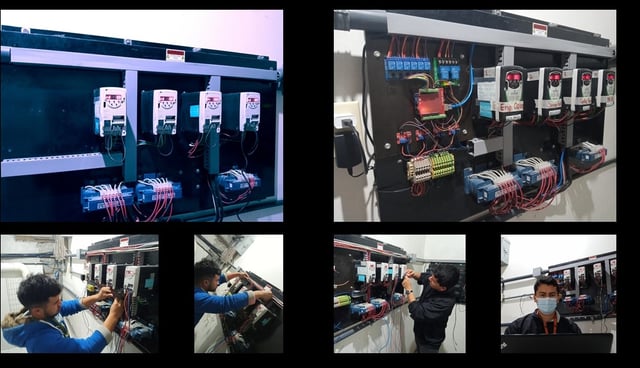Automated VFD Airflow System for Efficient Cooling, with Arduino and App
May 2021


Project Development
Developed using Arduino, enabling automated regulation of airflow distribution. Implemented four MOSFETs to generate a 0-10VDC control signal, adjusting the speed of Emerson VFDs via PWM (Pulse Width Modulation), each drive was programmed to operate between 0-60Hz, adjusting blower speed dynamically based on received voltage.
Key aspects of the development included:
🔹 Custom Mobile Control Interface – A mobile application was developed to allow users to adjust airflow settings remotely. Commands were sent via a RESTful API, enabling real-time control of the system.
🔹 VFD & PWM Voltage Control – The Arduino controlled four VFDs (Variable Frequency Drives) using MOSFETs to generate a 0-10VDC signal via PWM. The VFDs adjusted blower speeds from 0-60Hz based on this voltage input, optimizing airflow distribution.
🔹 Electrical Schematic Design & Wiring – Designed a complete electrical schematic detailing the integration of all components, including wiring for VFDs, relays, and control circuits. Worked closely with an electrician to ensure correct implementation and safe operation.
🔹 Automated Heat Extraction System – The system efficiently redirected excess heat from underground blowers (located 4 meters below ground) to four key areas: server room, offices, control center, and conference room, using 3” and 4” PVC ducting.
🔹 Efficiency & Facility Optimization – By automating temperature regulation, the system reduced manual adjustments and improved energy efficiency, ensuring stable environmental conditions in critical facility areas.
This structured implementation ensured a reliable, responsive, and energy-efficient cooling solution tailored for critical environments.
Video explanation
This video explains a little about the technical parts of its development
Automated Air Injection Control with VFDs
Control system for four VFDs (Variable Frequency Drives) regulating air injection from four underground blowers (located 4 meters below ground).
5/20/20211 min read
